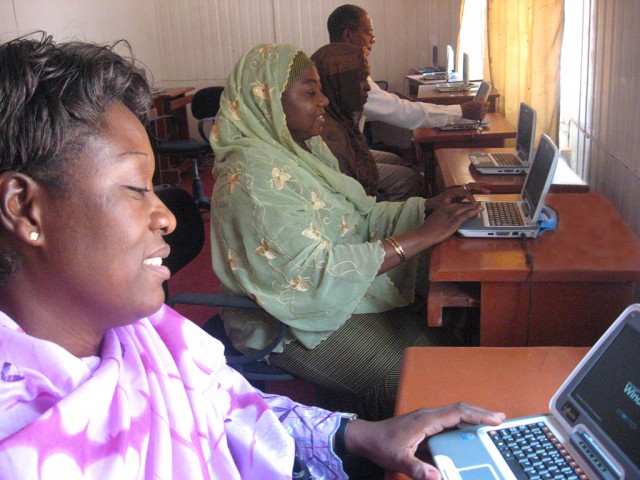
Jacqui Deelstra (Washington, CC)
During his historic, recent visit to Burma, President Barack Obama said to the Burmese people, “When your voices are heard by the government, it’s far more likely that your basic needs will be met.” In this statement he encapsulated the spirit of Making All Voices Count: Un grand défi pour le développement.
This effort was launched on Wednesday, Décembre 5 and brings together the Swedish International Development Agency (SIDA), the UK Department for International Development (DFID), USAID, and the Omidyar Network. They have established a $45 million fund to help harness new technologies, such as social media and mobile phones, to enable citizen engagement and improve government responsiveness. Funded under the partnership will be innovations that seek inclusive ways to empower all citizens to voice their concerns and demands and to improve governments’ responsiveness and accountability to those citizens.
Pour moi, this is an incredibly exciting initiative that highlights work done by organizations that I respect and know well. As a master’s student, dans 2010, I spent my summer in Tanzania researching projects that encouraged citizens to use their mobile phones to report on service delivery issues, such as electricity outages and teacher absenteeism. I was extremely privileged to be hosted by Twaweza, an initiative founded by Rakesh Rajani, that Samantha Power highlighted during the launch event. Twaweza believes in the power of information and that citizens can lead change in their communities and hold governments accountable when they have access to the right information and channels to make their voices heard. Though as Ms. Power pointed out, citizens are not naïve and recognize that motivating a government to change its behavior and build the systems needed to be responsive to citizen needs is incredibly challenging.
The efforts of a Twaweza partner in Tanzania, Daraja, were also mentioned by Ms. Pouvoir. Daraja put in place a system for citizens to report broken water points to government water engineers using SMS and observed the process to ensure response to those reports. MS. Power explained during the launch event that this project largely failed because people did not believe reporting would make a difference. They had for so long have been failed by their government and been voiceless that they did not believe anything would be different this time.
What we learn from initiatives such as Twaweza and Daraja is that the technology really is the easy part. One can set-up a short code to receive SMS messages from citizens or a website to display budget information relatively easily. But getting desired citizen and government involvement is a far greater challenge.
Similar opinions were expressed by the distinguished speakers at Wednesday’s launch event. Justine Greening, the UK’s Secretary of State for International Development, said that while internet and mobile devices can change the way that government and citizens interact, she knows that some interventions that funded by DFID have failed because they focused on the technology and not on the people using the intervention.
Charlotte Petri Gornitzka, Director-General for SIDA, expressed that more dialogue with governments and political will is needed to ensure citizen voices are heard. She said SIDA has worked well with citizens and NGOs to adopt new technologies for advocacy, but the question remains as to whether there has been political buy in and if it has actually made a difference.
An initiative to facilitate this government dialogue is the Open Government Partnership (OGP). OGP is currently made up of 57 countries that have agreed to greater disclosure of government information, such as budgets, and adopted a national action plan to work towards improving citizens’ access to information.
In his remarks, Administrateur de l'USAID, Rajiv Shah, said when technology is applied responsibly and fitting with the local context, it allows people to demand better services, fight corruption, and ensure transparency. I agree with this statement, but there is another part of the equation. This is the work being done by international development organizations to build the capacity of citizens in emerging democracies to articulate effectively their needs to their governments, while also to ensure governments have the necessary systems in place to respond to citizen demands. When this foundation is in place, technology truly can be transformative in making sure voices are not only heard, but also that governments can respond appropriately and effectively.
Jacqui Deelstra, Associé de programme pour la technologie, Associés créatifs internationaux.